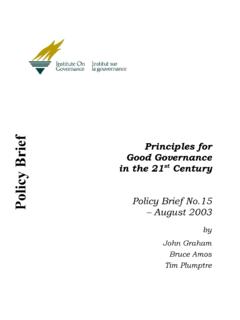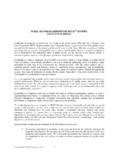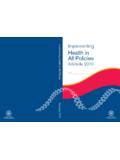Transcription of Governance in the 21st Century - OECD.org
1 FUTURE STUDIESG overnance in the 21st CenturyAs we move into the 21st Century , the turbulent transformation of economy and society looks set to continue. Growing integration of markets, radical newtechnologies, the increasing knowledge intensity of human activity, all point to the emergence of an immensely complex world. But how will it be managed? And by whom? What forms of organisation and decision-making will be requiredat local, national and global levels to meet the challenges of the next decades? One thing seems certain: old forms of Governance in the public sector, corporations and civil society are becoming increasingly ineffective. New forms of Governance will be needed over the next few decades which will involvea much broader range of active players.
2 Traditional hierarchical organisations andtop-down control will give way more and more to a wider diffusion of responsibilityand decision-making that builds on the talents for innovation and creativity ofindividuals and groups. This book explores some of the opportunities and risks economic, social andtechnological that decision-makers will have to address in the coming years,and outlines what needs to be done to foster society s capacity to manage itsfuture more flexibly and with broader participation of its in the 21st CenturyGovernance in the 21st CenturyFUTURE STUDIESISBN 92-64-18541-003 2001 01 1 P-:HSTCQE=V]ZYV]: OECD, 2001. Software: 1987-1996, Acrobat is a trademark of rights reserved.
3 OECD grants you the right to use one copy of this Program for your personal use reproduction, lending, hiring, transmission or distribution of any data or software isprohibited. You must treat the Program and associated materials and any elements thereof like any othercopyrighted requests should be made to:Head of Publications Service,OECD Publications Service,2, rue Andr -Pascal, 75775 Paris Cedex 16, in the 21st CenturyORGANISATION FOR ECONOMIC CO-OPERATION AND Page 1 Friday, April 27, 2001 2:52 PMORGANISATION FOR ECONOMIC CO-OPERATIONAND DEVELOPMENT Pursuant to Article 1 of the Convention signed in Paris on 14th December 1960,and which came into force on 30th September 1961, the Organisation for EconomicCo-operation and Development (OECD) shall promote policies designed.
4 To achieve the highest sustainable economic growth and employment and arising standard of living in Member countries, while maintaining financialstability, and thus to contribute to the development of the world economy; to contribute to sound economic expansion in Member as well as non-membercountries in the process of economic development; and to contribute to the expansion of world trade on a multilateral, non-discriminatory basis in accordance with international original Member countries of the OECD are Austria, Belgium, Canada,Denmark, France, Germany, Greece, Iceland, Ireland, Italy, Luxembourg, theNetherlands, Norway, Portugal, Spain, Sweden, Switzerland, Turkey, the UnitedKingdom and the United States.
5 The following countries became Memberssubsequently through accession at the dates indicated hereafter: Japan(28th April 1964), Finland (28th January 1969), Australia (7th June 1971), NewZealand (29th May 1973), Mexico (18th May 1994), the Czech Republic( 21st December 1995), Hungary (7th May 1996), Poland (22nd November 1996),Korea (12th December 1996) and the Slovak Republic (14th December 2000). TheCommission of the European Communities takes part in the work of the OECD(Article 13 of the OECD Convention).Publi en fran ais sous le titre :LA GOUVERNANCE AU XXIe SI CLE OECD 2001 Permission to reproduce a portion of this work for non-commercial purposes or classroomuse should be obtained through the Centre fran ais d exploitation du droit de copie (CFC),20, rue des Grands-Augustins, 75006 Paris, France, tel.
6 (33-1) 44 07 47 70, fax (33-1) 46 34 67 19,for every country except the United States. In the United States permission shouldbe obtained through the Copyright Clearance Center, Customer Service, (508)750-8400,222 Rosewood Drive, Danvers, MA 01923 USA, or CCC Online: All otherapplications for permission to reproduce or translate all or part of this book should be madeto OECD Publications, 2, rue Andr -Pascal, 75775 Paris Cedex 16, Page 2 Friday, April 27, 2001 2:52 PM 3 OECD 2001 ForewordIn the run-up to the preparations for EXPO 2000 the World Exposition inHanover, Germany the OECD Forum for the Future organised a series of fourconferences to take place beforehand around the theme of People, Nature andTechnology.
7 Sustainable Societies in the 21st Century . The series considered fourkey areas of human activity: technology, economy, society and government. Theconferences explored possible evolutions of key variables and analysed differentdevelopment paths in order to expose some of the main policy implications andoptions. Each conference provided analysis of underlying trends and policy direc-tions. However, the overall aim of the series was to build a comprehensive founda-tion for assessing the critical choices likely to face citizens and decision makers inthe next entire series benefited from special sponsorship by EXPO 2000 and fourGerman banks Bankgesellschaft Berlin, DG BANK Deutsche Genossenschafts-bank AG, NORD/LB Norddeutsche Landesbank, and Westdeutsche LandesbankGirozentrale (WestLB).
8 Additional financial support was provided by numerousAsian, European and North American partners of the OECD Forum for the book deals with the fourth and final conference in the series, hosted by theNORD/LB Norddeutsche Landesbank in Hanover, Germany on 25-26 March theme was 21st Century Governance : Power in the Global Knowledge Econ-omy and Society .Three main messages emerged from the discussions and analyses that aresummarised in the pages that follow. First, old forms of Governance in both thepublic and private sectors are becoming increasingly ineffective. Second, the newforms of Governance that are likely to be needed over the next few decades willinvolve a much broader range of active players.
9 Third, and perhaps most impor-tantly, two of the primary attributes of today s Governance systems the usuallyfixed and permanent allocations of power that are engraved in the structures andconstitutions of many organisations; and, the tendency to vest initiative exclu-sively in the hands of those in senior positions in the hierarchy look set toundergo fundamental Page 3 Friday, April 27, 2001 2:52 PMGovernance in the 21st Century 4 OECD 2001 Harbingers of changes in the first attribute can be found in highly suppleorganisations, both public and private, that are capable of regularly redistributingresponsibility according to the nature of the task rather than on the basis of a rigidauthority structure.
10 That spontaneous determination of the most appropriate levelfor wielding power and taking responsibility goes hand in hand with the weaken-ing of the second attribute of most prevailing Governance systems, a decline inhierarchical or top-down methods for determining goals and , at the leading edge of many economies and societies particularlyin areas where the production of intangibles and personal customisation arebecoming dominant initiative is shifting to the people who have detailed knowl-edge of what is desired and what is possible. Traditional leaders in either theworkplace or the public sphere can no longer specify in advance exact outcomesor methods. Instead, in the context of shared missions and common rules, theobjectives and techniques are being left to the unforeseeable innovations andcreativity of the individuals and groups that have a deeper understanding of thespecific needs and and creative liberty, however, has very exacting the future, more diffused approaches to Governance in all parts of society willonly work if there are frameworks in place that assure very high levels of transpar-ency, accountability and integrity.
















